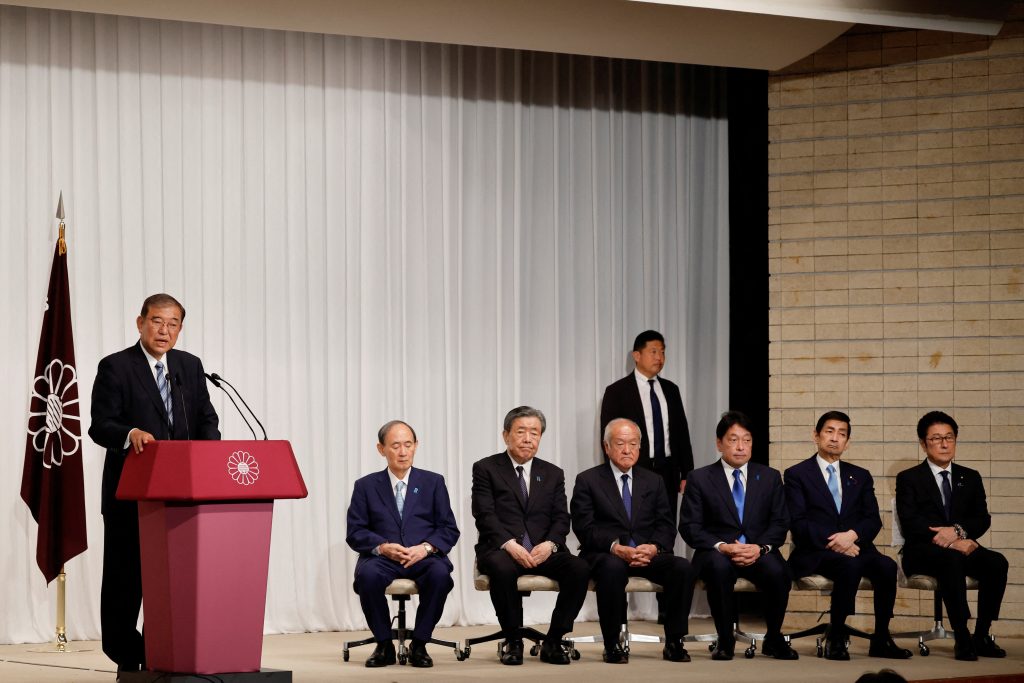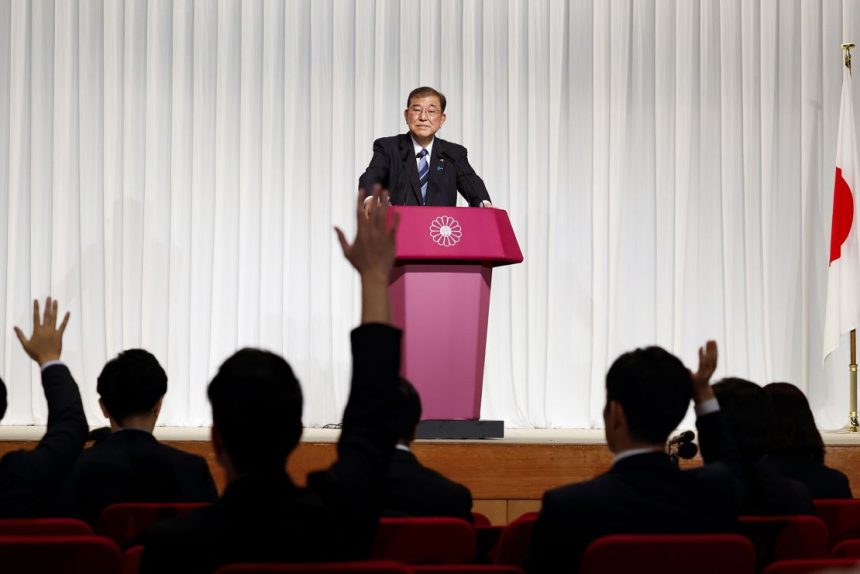The future of Japan’s government is hanging in the balance following a tumultuous weekend snap election, where voters delivered a resounding blow to Prime Minister Shigeru Ishiba’s ruling coalition. The scandal-laden alliance, led by the Liberal Democratic Party (LDP) and its junior partner Komeito, now finds itself struggling to secure the mandate needed to steer the world’s fourth-largest economy amid economic and security pressures.
The election results, which left no single party with a clear path to governance, have sparked significant market reactions. The yen hit a three-month low as financial analysts brace for what could be an extended period of political maneuvering and coalition-building, potentially with a new leader at the helm.
The weekend’s electoral outcome was a stark reminder of the fragility of voter support for the incumbent government, which has recently been tainted by a funding scandal and growing public frustration over the rising cost of living.
The ruling coalition saw a sharp reduction in its parliamentary representation, dropping from 279 seats to 215. This blow was underscored by the loss of two cabinet ministers and the seat of Komeito’s leader, Keiichi Ishii.
Prime Minister Ishiba, addressing the media on Monday, acknowledged the precarious situation facing his government and the urgent need for continuity, particularly as Japan confronts economic headwinds, tense security dynamics in the region, and upcoming elections in the United States.

“We cannot afford a moment of stagnation as we face very difficult situations both in our security and economic environments,” Ishiba stated, expressing his intent to remain as premier despite the setback.
The main opposition, the Constitutional Democratic Party of Japan (CDPJ), emerged as the biggest winner in the election, securing 148 seats—up from its previous 98 seats. Although this boost in representation brings the CDPJ closer to the ruling coalition’s numbers, it still falls short of the 233 seats needed for a parliamentary majority.
READ ALSO: Google’s Ambitious Project: Developing AI to Autonomously Navigate and Operate Computers
The CDPJ’s leader, Yoshihiko Noda, has expressed a strong willingness to collaborate with other opposition groups in a bid to challenge the incumbents, though many political analysts see a shift in power as a distant possibility. Noda’s efforts to forge alliances with other parties could, however, enhance the opposition’s leverage in upcoming negotiations, potentially impacting the direction of policy and governance.
As the political landscape stands, a critical parliamentary vote on the next prime minister is scheduled for November 11, as reported by multiple sources within the ruling coalition via Kyodo News. For Ishiba, who only assumed the premiership less than a month ago, this vote could determine his political future. Facing mounting pressure from within the LDP and with the coalition’s weakened position, his leadership faces significant uncertainty.
Political analysts are already weighing in on Ishiba’s prospects, with some suggesting he may be relegated to a caretaker role should he fail to secure enough support within the party. Tobias Harris, the founder of political risk advisory firm Japan Foresight, stated, “It seems unlikely that he (Ishiba) will survive to lead a new government as prime minister … though it is possible he could stay on as caretaker.”

The election results mark one of the most significant setbacks for the LDP, a party that has governed Japan almost uninterruptedly since World War II. The last time the LDP experienced a defeat of this magnitude was in 2009, when it temporarily ceded control to the Democratic Party of Japan, a predecessor of the current CDPJ. This loss highlights a rare moment of vulnerability for a political force that has traditionally held a steady grip on Japanese governance.
This period of political upheaval comes at a particularly challenging time for Japan. Economically, the nation faces persistent inflationary pressures, high living costs, and global financial volatility.
On the security front, Japan’s proximity to an assertive China and nuclear-capable North Korea places its national defense strategy in sharp focus. The stability of Japan’s government will be crucial in navigating these complex challenges, which demand decisive action on both domestic and international fronts.
With no single party holding a parliamentary majority, smaller political factions may now play an influential role in shaping the next government.
This election has underscored Japan’s political volatility, and negotiations in the coming weeks could see unexpected alliances or even shifts in the LDP’s leadership structure. While Prime Minister Ishiba remains committed to maintaining his role, the outcome of the November 11 parliamentary vote may ultimately force a reshuffling of Japan’s leadership.
In the days to come, all eyes will be on Japan as it seeks a path forward in a highly complex political environment. The outcome of these coalition negotiations and the impending leadership vote will not only shape the future of the LDP but also have implications for Japan’s position on the global stage.
READ ALSO: NAFDAC Launches Committees on Breast Milk Substitute Regulation
As Japan grapples with internal and external pressures, its political leaders will need to address both the nation’s economic challenges and security imperatives in a way that aligns with the evolving expectations of its citizens.
Just a month after his close win as leader of the Liberal Democratic Party (LDP), Prime Minister Shigeru Ishiba’s bid for a stronger public mandate backfired in a snap election, with voters responding sharply to scandals over unrecorded donations linked to LDP lawmakers. Despite the LDP’s efforts to distance itself from implicated candidates, recent reports showed campaign funds still reaching their branches, further eroding public trust.

Support from the Democratic Party for the People (DPP) and the Japan Innovation Party (JIP), which secured 28 and 38 seats respectively, now becomes crucial for the LDP’s policy agenda. While both DPP and JIP leaders are hesitant to join the coalition, they are open to collaborating on specific policies, which may pressure the LDP to consider their calls for economic reform, including a temporary sales tax cut and changes to the Bank of Japan’s approach to monetary policy.
On a positive note, the election saw historic gains for female representation, with 73 women elected to Japan’s parliament—a significant leap from 54 in 2009.

